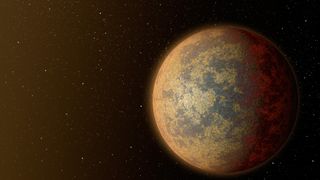The oldest continents in the Milky Way may be 5 billion years older than Earth's
Several exoplanets at the edge of our galaxy could have formed continents — and advanced life — 5 billion years earlier than Earth, new research suggests.

The oldest continents in our galaxy may have arisen 5 billion years before Earth’s, new research suggests — and that means there may be multiple worlds in the Milky Way harboring alien life even more advanced than our own.
Astrobiologists think a planet needs to have certain features to support life: oxygen in its atmosphere, something to shield organisms from dangerous radiation and liquid water, for a start. Although big land masses aren't strictly necessary for living things to emerge, Earth's history shows that they're important for life to thrive and exist for long periods of time. So, if an exoplanet had continents before Earth, it follows that there might be older, more advanced life on that world.
This line of thought led Jane Greaves, an astronomer at Cardiff University astronomer in the U.K., to answer the question: When did the first continents appear on a planet in our galaxy? Turns out, two exoplanets' continents — and perhaps life — may have arisen four to five billion years before Earth's.
If life on another planet had a five-billion-year head start, it "could potentially host life more evolved than us," Greaves wrote in a study, published in the September issue of the journal Research Notes of the American Astronomical Society.
Continents form due to plate tectonics, the movement of plates of rock that float atop the molten innards of a planet. Heat from a planet's core keeps that magma from hardening and halting continents' movement. That heat comes from radioactive elements — like uranium-238, thorium-232, and potassium-40 — in the planet's core, which give off energy as they decay.

Most of those radioactive elements came from catastrophic cosmic events, like supernova explosions and collisions between the dead husks of giant stars, known as neutron stars. Traces of those elements can be detected in the wavelengths of light that stars emit. In her new work, Greaves used levels of uranium-238 and potassium present in nearby stars, plus the ages of stars as measured by the Gaia satellite, to estimate when a hypothetical rocky planet around each of these stars became hot enough for plate tectonics to emerge.
She found that the first continents formed around nearby sun-like stars up to 2 billion years earlier than Earth's plate tectonics began. The oldest continents of a nearby star are around HD 4614, about 20 light-years from Earth. Earth's starting time, however, is average for our cosmic neighborhood.
Two stars stand out from the pack, though: The planets of two stars a bit smaller than our sun (HD 76932 and HD 201891), located 70 to 110 light-years away from us respectively in a region known as the "thick disk", could have formed continents up to 5 billion years earlier than us. Based on her sample of just 29 stars and astronomers' current best estimates for how likely a planet is to be habitable, Greaves wrote, "there could be two systems in this sample alone with biospheres more advanced than here on Earth."
Determining potentially interesting and habitable planets, like these identified by Greaves, is crucial preparation for NASA's future Habitable Worlds Observatory, which astronomers will use to observe Earth-like planets — and hopefully signs of life — in the 2040s. Greaves hopes future work will analyze more stars to determine if they could have planets with plate tectonics, which, she wrote, "could help to uncover more old systems where life on land could pre-date that on Earth."
Sign up for the Live Science daily newsletter now
Get the world’s most fascinating discoveries delivered straight to your inbox.

Briley Lewis (she/her) is a freelance science writer and Ph.D. Candidate/NSF Fellow at the University of California, Los Angeles studying Astronomy & Astrophysics. Follow her on Twitter @briles_34 or visit her website www.briley-lewis.com.
-
Jim Doggett I find it rather humorous that two exo planets, even if supporting life as we know it, the author posits that both due to being a couple billion years older could have evolved life more advanced than our own. I think that watching too much Star Trek could be responsible. The notion that intelligent species are inevitable in the evolution of living organisms is a bit far fetched given that homo sapiens are a one in a trillion shot on this planet, alone, compared to all that has evolved.Reply
And a major event that undid an equilibrium that spanned millions of years was needed to pave the way to us, and would have endured for millions more had the mass extinction event not occurred. And without the sudden stirring of the evolutionary pot, dinosaurs would never have come close to evolving into intelligent life.
Plus how many other potential trajectories might life have evolved into were the event that lead to us having evolved been one percent greater or lesser in impact? Myriad other changes in the evolutionary path could have occured and it's not rational to assume that they would have lead to intelligent life when no such trajectory existed previously.
You could have billions of Earth like planets and still not be certain that intelligent life would come about at any time in the planets existence. The Fermi Paradox is spot on, IMO. If indeed we were the inevitable outcome of evolution, the Milky Way would be littered with it and the galaxy would be an orgy of signals that were obviously the creation of intelligent life. But there's nothing yet and I doubt there will be any time soon, as in we are still in existence.
And I believe human kind would be better served by understanding how truly precious and very possibly unique we are. We might be better to one another and take preserving this planet more seriously. Colonizing Mars is absurd. Try colonizing Antarctica. At least it's got breathable air and ample sources of fresh water. Billionaire's folly should not cloud or reason, much less science fiction nonsense, especially among our scientific community. -
TorbjornLarsson Reply
The paper was looking at possibilities: "could have evolved life more advanced than our own." Anatomically modern humans almost certainly is a rare outcome of evolution - if that and not intelligence is your yard stick - but the planet numbers stack up.Jim Doggett said:I find it rather humorous that two exo planets, even if supporting life as we know it, the author posits that both due to being a couple billion years older could have evolved life more advanced than our own.
The so called "paradox" was a question resolved by Fermi himself: as long as we don't know if we can travel to other planetary systems there isn't any tension in our observations.
Your futile rant against science and technology is neither here nor there. -
Paul Mah ReplyJim Doggett said:I find it rather humorous that two exo planets, even if supporting life as we know it, ...The notion that intelligent species are inevitable in the evolution of living organisms is a bit far fetched...
And a major event that undid an equilibrium that spanned millions of years was needed to pave the way to us, and would have endured for millions more had the mass extinction event not occurred. And without the sudden stirring of the evolutionary pot, dinosaurs would never have come close to evolving into intelligent life.
Plus how many other potential trajectories might life have evolved into were the event that lead to us having evolved been one percent greater or lesser in impact? Myriad other changes in the evolutionary path could have occured and it's not rational to assume that they would have lead to intelligent life when no such trajectory existed previously... believe human kind would be better served by understanding how truly precious and very possibly unique we are. We might be better to one another and take preserving this planet more seriously. Colonizing Mars is absurd. Try colonizing Antarctica.
Earth's life has developed from cooperation to conquer... the 1st multicellular life was a cooperation to consume, the path since has been for those cooperations to dominate.
Our Homo Sapien intelligence has developed from dominating other life on our planet.
You assume a LOT putting our evolutionary path as the only path to intelligence.
And did you really suggest colonizing Antarctica? Why don't you suggest the speed-up of destroying this planet by saying we can just Nuke it to temperate climates. -
Jim Doggett Reply
I don't assume that at all. Intelligence can come in many forms, such as big lizards or fishes and birds. I reject the notion that human like intelligent life is an inevitability or even at all likely. Exceedingly remote possibility, since we are a 1 in a Trillion outcome on this planet. And in the Grand history of it have been around half a million years and can see our own success could conceivably be an extinction level event, I'd not bet paychecks we'd make it another half million years.Paul Mah said:Earth's life has developed from cooperation to conquer... the 1st multicellular life was a cooperation to consume, the path since has been for those cooperations to dominate.
Our Homo Sapien intelligence has developed from dominating other life on our planet.
You assume a LOT putting our evolutionary path as the only path to intelligence.
And did you really suggest colonizing Antarctica? Why don't you suggest the speed-up of destroying this planet by saying we can just Nuke it to temperate climates.
A supreme rarity and around a blink of an eye in our own geological time. If other intelligence is out there somewhere it's irrelevant. We won't ever know nor will they. That's Star Trek fantasy. -
Hartmann352 I’d like to offer the nickels worth of information.Reply
Our rise to intelligence required a stable G2 star on the main sequence of the Hertzsprung/Russell diagram, a stable orbit in the habitable zone, a plethora of comets to deliver water over a billion years, a companion moon of sufficient size* to soak up many of the incoming comets and meteors and a huge outer planet like Jupiter to absorb many of the rocks whistling out of the Kzuiper belt.
We won’t understand other planets until we can accurately quantify the above.
* The moon is a bit more than one-quarter (27 percent) the size of Earth, a much larger ratio (1:4) than any other planet and their moons. Earth's moon is the fifth largest moon in the solar system. The moon's gravitational force is about 16.6 % of Earth's gravity.
See: https://www.space.com/18135-how-big-is-the-moon.html
Hartmann352
Most Popular

By Harry Baker

By Sascha Pare